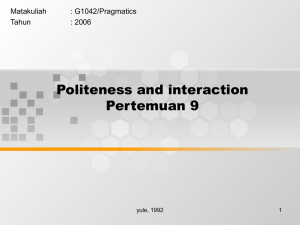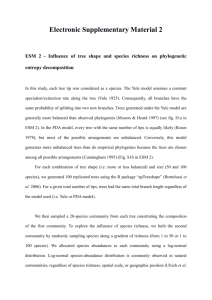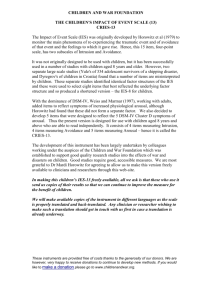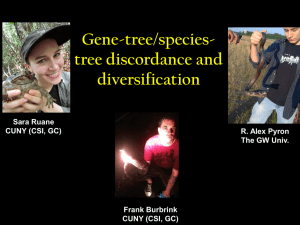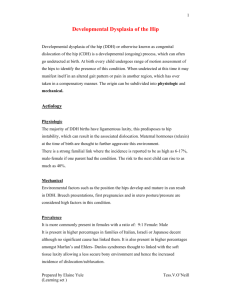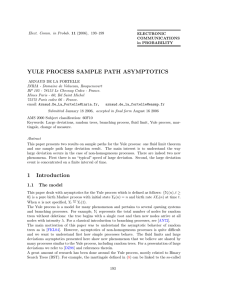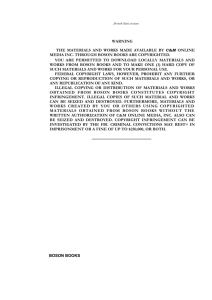Yule Distribution
advertisement
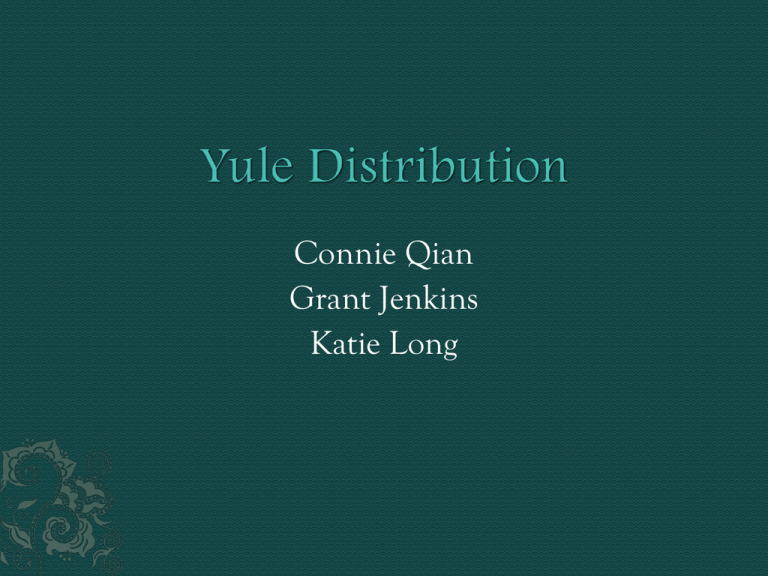
Connie Qian Grant Jenkins Katie Long Introduction Definition, parameters PMF CDF MGF Expected value, variance Applications Empirical example Conclusions Yule (1924) “A Mathematical Theory of Evolution…” Simon (1955) “On a Class of Skew Distribution Functions” Chung & Cox (1994) “A Stochastic Model of Superstardom: An Application of the Yule Distribution” Spierdijk & Voorneveld (2007) “Superstars without talent? The Yule Distribution Controversy” Brief History Discrete Probability Distribution p.m.f: 𝑓 𝑥 = 𝜌 ∗ 𝐵(𝑥, 𝜌 + 1) where x ≥ 1 𝜌 > 0 Beta Function: 1 Γ(𝑥)Γ(𝜌 + 1) 𝑡−1 𝜌 𝐵 𝑥, 𝜌 + 1 = 𝜆 (1 − 𝜆) 𝑑𝜆 = Γ(𝑥 + 𝜌 + 1) 0 c.d.f: 𝐹 𝑥 = 1 − 𝑥 ∗ 𝐵 𝑥, 𝜌 + 1 P.M.F. 𝜌 =0.25, 0.5, 1, 2, 4, 8 C.D.F. E[X] 𝜌 = 𝜌−1 Var[X] = M.G.F. , 𝜌 >1 𝜌2 𝜌−1 2 (𝜌−2) 𝜌 ∞ (1)𝑛 (1)𝑛 = ( 𝑛=0 𝜌+1 (𝜌+2)𝑛 Pochhammer Symbol ∗ 𝑒 𝑡𝑛 𝑡 )𝑒 𝑛! Distribution of words by their frequency of occurrence Distribution of scientists by the number of papers published Distribution of cities by population Distribution of incomes by size Distributions of biological genera by number of species Distribution of consumer’s choice of artistic products Small number of people have a concentrate of huge earnings Low supply, high demand Does it really have to do with ability (talent)? If not, then the income distribution is not fair! There are many theories of why only a few people succeed (Malcolm Gladwell, anyone?) Chung & Cox predicts that success comes by LUCKY individuals, not necessarily talented ones persons records 1 2 3 4 ⋮ Prediction of number of gold-records held by singers of popular music # of Gold-records indicates monetary success Yule distribution is a good fit when 𝜌 = 1 (this means that the probability that a new consumer chooses a record that has not been chosen is zero) 𝑓 𝑖 = 𝜌𝐵(𝑖, 𝜌 + 1) Recall that 𝐵 𝑥, 𝑦 = 1 = (1−𝛿) Γ(𝑥)Γ(𝑦) Γ(𝑥+𝑦) 𝜌 and δ≈0, so 𝜌 ≈ 1 f(i) = B(i, 1+1), i=1,2,… Γ(𝑖)Γ(1+1) = Γ(𝑖+2) F(x) = 𝑥 1 1 𝑖+1 𝑖 = = 1! 𝑖−1 ! 𝑖+1 ! 𝑥 𝑥+1 = 𝑖−1 ! 𝑖+1 𝑖 𝑖−1 ! = 1 𝑖 𝑖+1 E[X] does not exist 𝑖 ∞ 𝑖=1 𝑖(𝑖+1) = 1 ∞ 𝑖=1 (𝑖+1) Harmonic Series Var[X] does not exist M.G.F. 1 ∞ (1)𝑛 (1)𝑛 = ( 𝑛=0 2 (3)𝑛 ∗ 𝑒 𝑡𝑛 𝑡 )𝑒 𝑛! Median of X 1 2 = 𝑥 𝑥+1 x=1 Mode of X 1 Max( ) 𝑖(𝑖+1) 𝑑𝑦 1 𝑑𝑖 𝑖(𝑖+1) 0= −2𝑖+1 [𝑖 𝑖+1 ]2 0= Nearest integral to ½ is 1 1 2 =𝑖 Source: Chung & Cox (1994) 𝜌 =1 is implausible Because it requires that δ=0 Yule distribution with beta function doesn’t fit the data well Generalizes Yule distribution using incomplete beta fits the data better Yule distribution applies well to highly skewed distributions But finding the Yule distribution in natural phenomena does not imply that those phenomenon are explained by the Yule process



